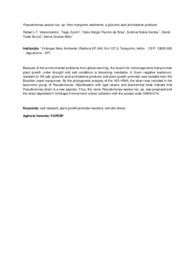Pseudomonas aestus nov. sp. from mangrove sediments: a gluconic acid and betaine producer.
Pseudomonas aestus nov. sp. from mangrove sediments: a gluconic acid and betaine producer.
Author(s): VASCONCELLOS, R. L. F.; ZUCCHI, T.; SILVA, F. S. P. da; SANTOS, S. N.; SOUZA, D. T.; MELO, I. S. de
Summary: Because of the environmental problems from global warming, the search for microorganisms that promote plant growth under drought and salt conditions is becoming inevitable. A Gram negative bacterium, resistant to 1M salt, gluconic acid and betaine producer and plant growth promoter was isolated from the Brazilian coast mangroves. By the phylogenetic analysis of the 16S rRNA, the strain was included in the taxonomic group of Pseudomonas. Hybridization with type strains and biochemical tests indicate that Pseudomonas strain is a new species. Thus, the name Pseudomonas aestus nov. sp. was proposed and the strain deposited in Embrapa Environment culture collection with the access code CMAA1215.
Publication year: 2015
Types of publication: Abstract in annals or event proceedings
Unit: Embrapa Environment
Observation
Some of Embrapa's publications are published as ePub files. To read them, use or download one of the following free software options to your computer or mobile device. Android: Google Play Books; IOS: iBooks; Windows and Linux: Calibre.
Access other publications
Access the Agricultural Research Database (BDPA) to consult Embrapa's full library collection and records.
Visit Embrapa Bookstore to purchase books and other publications sold by Embrapa.

